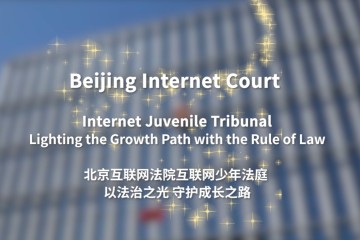A review of BIC’s work in past three years
September this year marks the three-year found anniversary of the Beijing Internet Court (BIC).
In the past three years, the BIC has accepted 113,932 cases and closed 103,437 of them. All cases were filed on-line with 99.85 percent of them heard online. The average trial time is about 37.01 minutes and the average trial cycle is 68.57 days.
According to Zhang Wen, president of the BIC, the court has trialed a number of gap-filling, rule-establishing and demonstrative internet-related cases by giving full play to the advantages of centralized jurisdiction, typical cases and professional trials.
The court has established a judgment concept of making rules through trials, promoting governance by rules and propeling development by governance. Moreover, it achieved the goals of standard setting, boundary clarifing and governance promotion via judicial adjudication.
The BIC has centralized jurisdiction over 11 specific types of internet cases of the first instance that are supposed to go to grassroots courts in Beijing. According to statistics, in the past three years, nearly 80 percent of its cases were related to copyright ownership and infringement disputes, amounting 11,124 cases at 9.76 percent of the total. Online tort liability disputes and online shopping contract disputes amounted 8,188 at 7.19 percent. The other types include online financial loan contract disputes, small loan contract disputes and network service contract disputes.
With the multifunctional, whole-procedure and integrated online litigation service platform, the BIC has achieved a full online operation of all procedures, including prosecution, mediation, registration, hearing, delivery and execution. The online filing rate of filing applications ws 100 percent, the online payment rate of litigation costs was 94.61 percent, the electronic delivery rate of judgment documents was 92.20 percent, and the automatic performance rate of judgment documents was 93.46 percent, according to Zhang.
Over the past three years, the BIC has adopted trial-driven rule formation, stayed technologically neutral to encourage technology for people's benefit, and attached equal emphasis on standardization and civilization to matters related to new business modes so as to encourage content creation and stimulate creative vitality. It also reasonably defined platform responsibilities and behavior boundaries to firmly protect citizens' interests in the internet era and maintain cyberspace order.
Moreover, the BIC continued to explore a new pattern of shared governance on the source of litigation. In 2020, together with the Beijing Municipal Bureau of Copyright and the Beijing Copyright Protection Center, the court launched an e-copyright litigation-source governance model that achieved source prevention and efficient resolution of digital copyright disputes, with technological empowerment such as block chains and smart contract technologies. Efforts were also made to explore a blockchain-based digital governance service system. The BIC has worked with 27 related departments and initiated a block chain ecological alliance to promote digital eco-construction and the development of digital economy.

 Judicial White Paper
Judicial White Paper
 Play
Play Play
Play Online Lawsuit Guide
Online Lawsuit Guide Beijing Internet Court Lawsuit Service WeChat Account
Beijing Internet Court Lawsuit Service WeChat Account  Beijing Internet Court WeChat Account
Beijing Internet Court WeChat Account